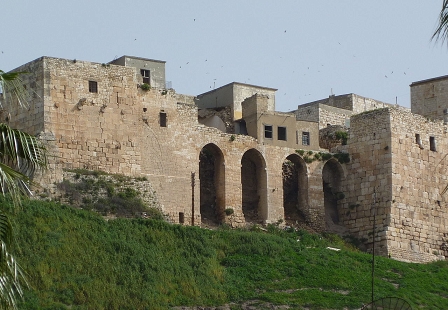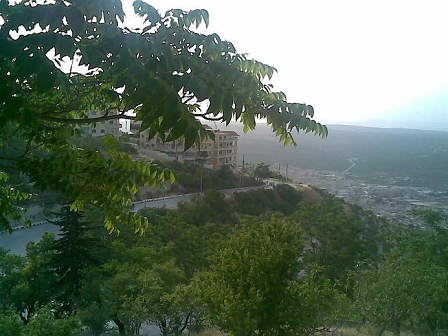Erstellt am: 16. 4. 2016 - 11:44 Uhr
The Death Trip - Part 5
Bode37 ist im Sommer aus Syrien geflohen, wo er als Lehrer gearbeitet hat. Für uns erzählt er von seiner Flucht aus Latakia. Hier der fünfte Teil seiner Erinnerungen. Er heißt natürlich nicht wirklich so; aus Sicherheitsgründen bevorzugt er für seine Geschichte ein Pseudonym.
Memories haunting Bode 37
- Part 1: I will tell you a story about my country, about Syria, whose war has stolen most of her children.
- Part 2: Paradise Lost, the pain of leaving home
- Part 3:Assad calling the ghosts of war and the tale of the two Colonels.
- Part 4: Goodbye in the darkest of nights.
- Part 5: Passing checkpoints one by one and finally leaving Syria.
- Part 6: The camp in the woods.
On the first of May 2015 I was swimming and drowning in my inner maelstrom. Fears and reality started to overlap. I was in hiding. Suddenly the door of my shelter, the apartement of a friend in (…), opened and I smelled my brother's perfume before I saw his exhausted face. He lit a cigarette to burn all our fears and puffed them away like smoke. His voice cut through the heavy silence in the room and he told me to get prepared because the "trip" is going to happen tomorrow. He gave me a long hug and then he was gone again. I could not sleep that night and my inner voices had nothing to say aswell. I was lying there in a coffin of complete silence.
The next morning I found myself in the passenger seat of my brother's car. I knew it was the last time I would ride along these streets. I tried to draw a map in my head engraving all the details in my memory. We made a quick stop and my brother fetched me a cup of coffee to get me out of stasis. He was smiling, trying to make me feel safe and give me power to face what was lying ahead of me. He passed on my mother's recommendations, giving trust and comfort to me, his little brother. Inside my head there was just a black abyss. At that point I had already lost my past, the present and the future were covered by unknown blackness.
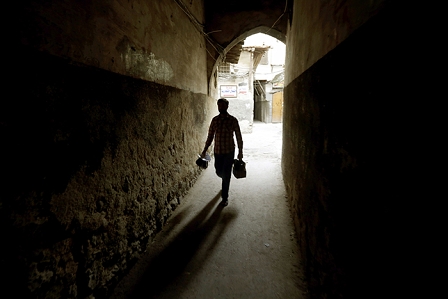
AFP PHOTO / JOSEPH EID
My brother received a call and told me that we have to move to the meeting point near the tunnel. After we stopped there, the horror movie was about to begin. I hugged him and tears were the only form of communication that was left. As a goodbye he told me to stay safe. I stared at my brother's face as he left. I was trying to smell him as long I was alone near the entry of the motorway tunnel. I was scared and my heart was beating fast. I don’t know how much time has passed until a small white car stopped in front of me and the driver called my name.
Alone in the car with two strange men I kept silent until one of the men asked me about the small bag in my hand because he wanted to search it, just to make sure.
I handed him the bag without concern. My money was hidden somewhere else.
My brother´s mother in law, a smart Croatian woman that lived in Latakia years ago, had made me trick pants with double pockets, so when the men started to search my bag I was confident. After that the man gave me an ID and asked me to memorize all the details of the ID in my head in case someone at the military checkpoints asked me about it.
He warned me that in case any solider would discover that the ID doesn’t belong to me, they would not know me, claiming that I was just a hitchhiker they had picked up on their way. The driver warned me to be a smartass because I have family in Syria to worry about. I couldn’t take breath after he issued that threat so I just concentrated on learning the details of my new identity by heart.
The car stopped at a small shop and the driver bought some cigarettes, tobacco for Shisha and bottles of beer. I assumed these goods would be needed to pass the military checkpoints. As I expected, at the first military checkpoint the driver gave the solider beer and cigarettes. We left without any questions. The scenario repeated at every checkpoint until we arrived to the last one at Al Madek Castle about 60 kilometers from the Turkish border.
The driver told me that this checkpoint is very difficult to pass. The soldiers would take me to a small room and I would have to take off all my clothes. The driver told me, if I hid anything, I should give it to him, for my own safety. I was confused, I closed my eyes and somehow there was a sound whispering in my ears telling me to stay strong and not give anything to the driver. So I told him that I carry nothing on my body or in my clothes. We were rolling very, very slowly into the military checkpoint. I was afraid that I would have to get out of the car and would be searched but Assad´s soldiers just waved us through. At this moment I could not feel relief because 300 meters from the military checkpoint I saw the flag of their enemies, the Jihadist Al-Nusra front. I couldn’t trust my eyes: They are 300 meters apart and they see each other and no one is firing. No clashes? Still I could feel that that didn't mean peace.
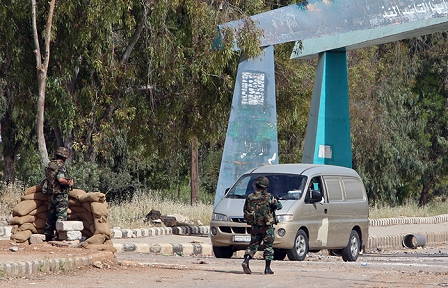
AFP PHOTO/LOUAI BESHARA
What astonished me even more was how normal life was at this place at the front line of government troups and jihadists. People were walking down the streets, the shops were open and children were playing. There were no shattered buildings, it was a completely normal city on the other side of Syria, the side which is controlled by the Al-Nusra.
The driver asked me to wait for him in front of an old building. I was looking at the old big castle; the sun was shining in the clear sky. A lovely soft voice was coming from the building and there was an old friendly lady who invited me to have a glass of cold water. She noticed that I was surprised how people were living a normal life here. So she told me something that made me even more furious about the insanity of this war:
She said, that the Assad regime and Al-Nusra made a deal to stop fighting and to make money of the people fleeing from Syria. They joined forces to profit from the refugees fleeing the country and get involved into human trafficking. Dirty business like what happened in my case. The diabolic logics of war know no morals. The same forces that unleash the horror upon the population, profit from the victims fleeing the country. Everyone who is fleeing is dealing with the same organization that made me arrive to Al Madik so easy and fast. The major who is responsible for the last military checkpoint at the Castle will take 30 percent from the money that I will hand to the boss in Turkey.
As I was about to finish my glass of water with the old lady a strange man with a long beard asked me to come with him. I turned to the old lady and with a shaking voice she told me to stay safe and gave me a warm goodbye kiss.
We got back into the same white car but the driver had disappeared. It was me, the strange man with the long beard and three others. They told me that it was their responsibility to drive me safely to Abo Hasan, the boss in Yaladagi, the Turkish village where I was expected.
It was 1 p.m. as we left from Al Madik passing the city Idlib in the north of Syria. I didn’t recognize the town because it was completely destroyed and there were checkpoints all over the road and signs: This road belongs to Al-Nusra! These were my last few meters in my home country Syria.
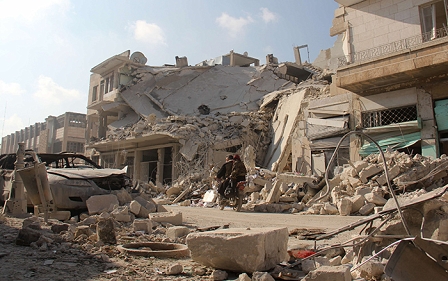
AFP PHOTO / OMAR HAJ KADHOUR


